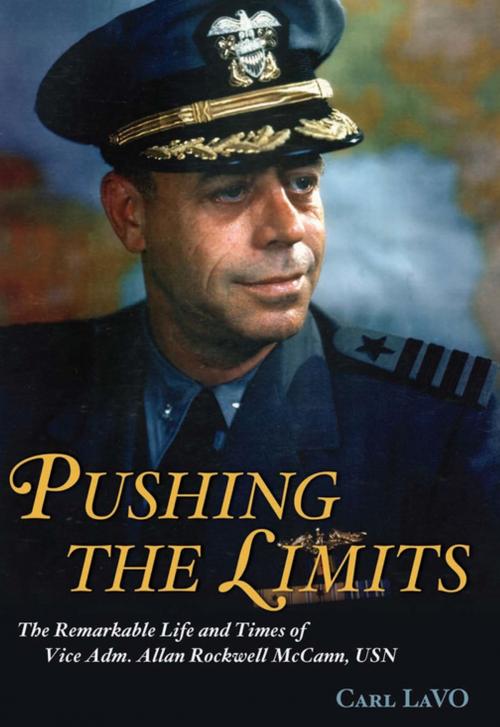Pushing the Limits
The Remarkable Life and Times of Vice Adm. Allan Rockwell McCann, USN
Nonfiction, History, Military, Naval| Author: | Carl P. LaVO | ISBN: | 9781612513348 |
| Publisher: | Naval Institute Press | Publication: | December 15, 2013 |
| Imprint: | Naval Institute Press | Language: | English |
| Author: | Carl P. LaVO |
| ISBN: | 9781612513348 |
| Publisher: | Naval Institute Press |
| Publication: | December 15, 2013 |
| Imprint: | Naval Institute Press |
| Language: | English |
His family says he was a great story teller. Yet Vice Admiral Allan Rockwell McCann left no reminisces that might reveal a deeper sense of his extraordinary service to the nation. In his four-decade military career spanning two world wars, he rarely discussed for the record the many historic circumstances that enveloped him. If you were to judge the admiral by his military awards and ribbons, they would not suggest the career he led. His signature achievement was development of a workable submarine rescue chamber. Yet Allan McCann, a man born to a Scottish tailor in a remarkable town in the Berkshire Mountains of Massachusetts, seemed to be always on the scene of historic events.
Among his accomplishments, he was the Navy’s liaison officer to modify the antiquated O-12 submarine into the privately-leased Nautilus that made the first attempt to sail beneath the Arctic ice shelf in 1931. He was submarine squadron commander deployed in the Pacific from Hawaii to search for survivors of the ill-fated Dole Air Race to Honolulu in 1927. He was aboard the sub tender Pelias and directed firepower to knock down Japanese aircraft attacking Pearl Harbor on 7 December 1941. He was commander of the battleship USS Iowa during the Battle of Leyte Gulf. He was Chief of Staff of the mysterious Navy’s 10th Fleet that stymied a last ditch effort by Nazi Germany to attack North America via U-boats in Operation Teardrop. He was commander of a Navy task force taking President Harry S. Truman to the Pottsdam talks in 1945 and relayed the message to him that an atomic bomb had been exploded over Hiroshima. As ComSubPac, he was aboard the first submarine in 1947 to navigate under the polar ice.
He also was the Navy Inspector General who assumed a pivotal role in the so-called Revolt of the Admirals in 1949.
Throughout his naval career, Admiral McCann was widely revered as a very efficient, competent officer who succeeded in many endeavors but did not boast of them nor seek self-promotion. Rather, he let the record speak for him. This book is an overdue appreciation of the admiral who has all but been ignored in naval history.
Among his accomplishments, he was the Navy’s liaison officer to modify the antiquated O-12 submarine into the privately-leased Nautilus that made the first attempt to sail beneath the Arctic ice shelf in 1931. He was submarine squadron commander deployed in the Pacific from Hawaii to search for survivors of the ill-fated Dole Air Race to Honolulu in 1927. He was aboard the sub tender Pelias and directed firepower to knock down Japanese aircraft attacking Pearl Harbor on 7 December 1941. He was commander of the battleship USS Iowa during the Battle of Leyte Gulf. He was Chief of Staff of the mysterious Navy’s 10th Fleet that stymied a last ditch effort by Nazi Germany to attack North America via U-boats in Operation Teardrop. He was commander of a Navy task force taking President Harry S. Truman to the Pottsdam talks in 1945 and relayed the message to him that an atomic bomb had been exploded over Hiroshima. As ComSubPac, he was aboard the first submarine in 1947 to navigate under the polar ice.
He also was the Navy Inspector General who assumed a pivotal role in the so-called Revolt of the Admirals in 1949.
Throughout his naval career, Admiral McCann was widely revered as a very efficient, competent officer who succeeded in many endeavors but did not boast of them nor seek self-promotion. Rather, he let the record speak for him. This book is an overdue appreciation of the admiral who has all but been ignored in naval history.
His family says he was a great story teller. Yet Vice Admiral Allan Rockwell McCann left no reminisces that might reveal a deeper sense of his extraordinary service to the nation. In his four-decade military career spanning two world wars, he rarely discussed for the record the many historic circumstances that enveloped him. If you were to judge the admiral by his military awards and ribbons, they would not suggest the career he led. His signature achievement was development of a workable submarine rescue chamber. Yet Allan McCann, a man born to a Scottish tailor in a remarkable town in the Berkshire Mountains of Massachusetts, seemed to be always on the scene of historic events.
Among his accomplishments, he was the Navy’s liaison officer to modify the antiquated O-12 submarine into the privately-leased Nautilus that made the first attempt to sail beneath the Arctic ice shelf in 1931. He was submarine squadron commander deployed in the Pacific from Hawaii to search for survivors of the ill-fated Dole Air Race to Honolulu in 1927. He was aboard the sub tender Pelias and directed firepower to knock down Japanese aircraft attacking Pearl Harbor on 7 December 1941. He was commander of the battleship USS Iowa during the Battle of Leyte Gulf. He was Chief of Staff of the mysterious Navy’s 10th Fleet that stymied a last ditch effort by Nazi Germany to attack North America via U-boats in Operation Teardrop. He was commander of a Navy task force taking President Harry S. Truman to the Pottsdam talks in 1945 and relayed the message to him that an atomic bomb had been exploded over Hiroshima. As ComSubPac, he was aboard the first submarine in 1947 to navigate under the polar ice.
He also was the Navy Inspector General who assumed a pivotal role in the so-called Revolt of the Admirals in 1949.
Throughout his naval career, Admiral McCann was widely revered as a very efficient, competent officer who succeeded in many endeavors but did not boast of them nor seek self-promotion. Rather, he let the record speak for him. This book is an overdue appreciation of the admiral who has all but been ignored in naval history.
Among his accomplishments, he was the Navy’s liaison officer to modify the antiquated O-12 submarine into the privately-leased Nautilus that made the first attempt to sail beneath the Arctic ice shelf in 1931. He was submarine squadron commander deployed in the Pacific from Hawaii to search for survivors of the ill-fated Dole Air Race to Honolulu in 1927. He was aboard the sub tender Pelias and directed firepower to knock down Japanese aircraft attacking Pearl Harbor on 7 December 1941. He was commander of the battleship USS Iowa during the Battle of Leyte Gulf. He was Chief of Staff of the mysterious Navy’s 10th Fleet that stymied a last ditch effort by Nazi Germany to attack North America via U-boats in Operation Teardrop. He was commander of a Navy task force taking President Harry S. Truman to the Pottsdam talks in 1945 and relayed the message to him that an atomic bomb had been exploded over Hiroshima. As ComSubPac, he was aboard the first submarine in 1947 to navigate under the polar ice.
He also was the Navy Inspector General who assumed a pivotal role in the so-called Revolt of the Admirals in 1949.
Throughout his naval career, Admiral McCann was widely revered as a very efficient, competent officer who succeeded in many endeavors but did not boast of them nor seek self-promotion. Rather, he let the record speak for him. This book is an overdue appreciation of the admiral who has all but been ignored in naval history.















